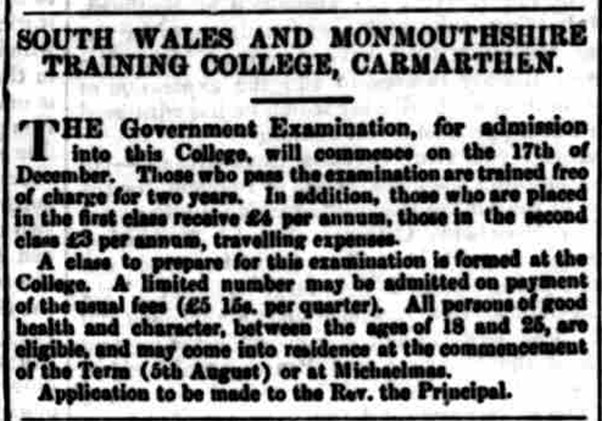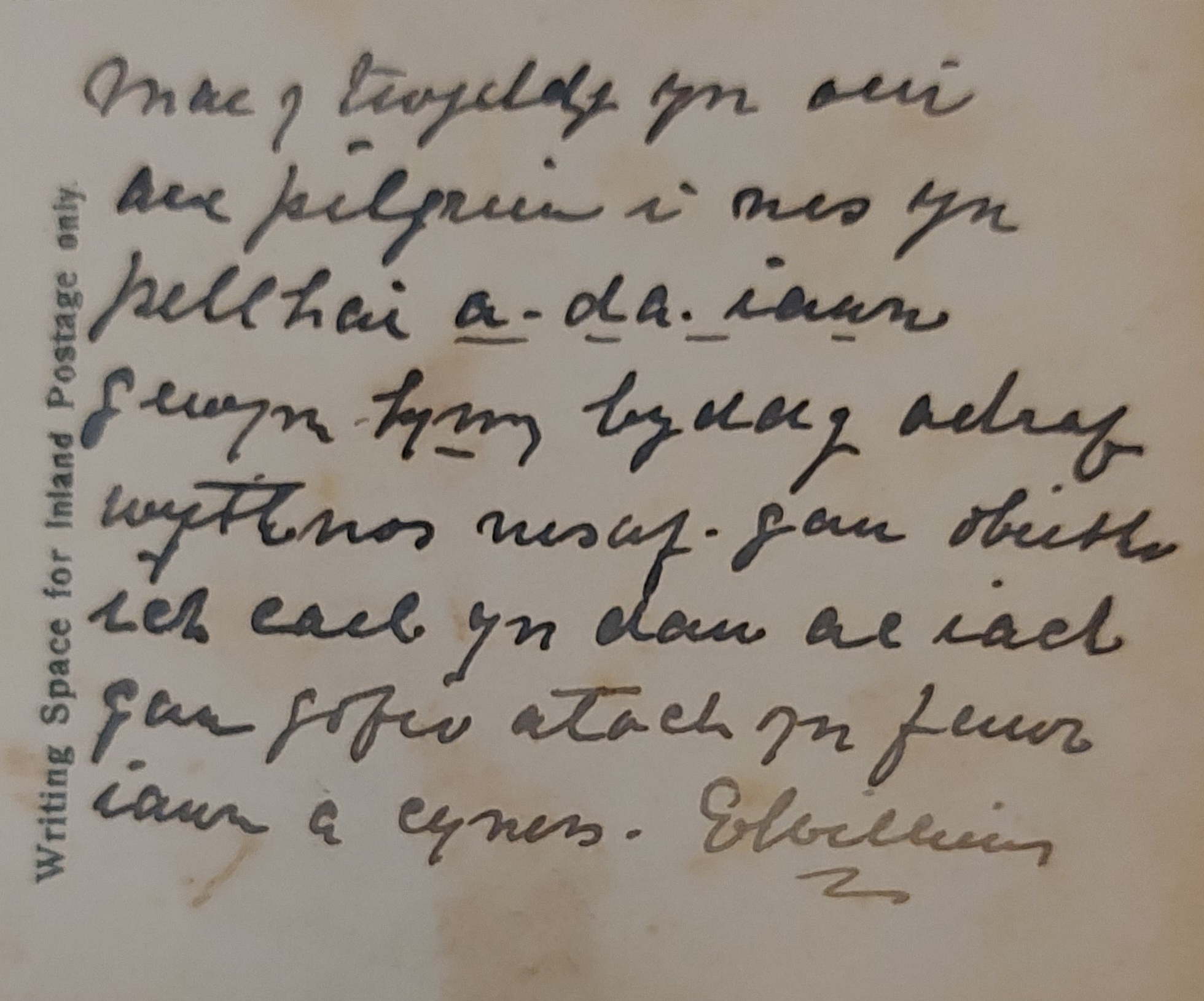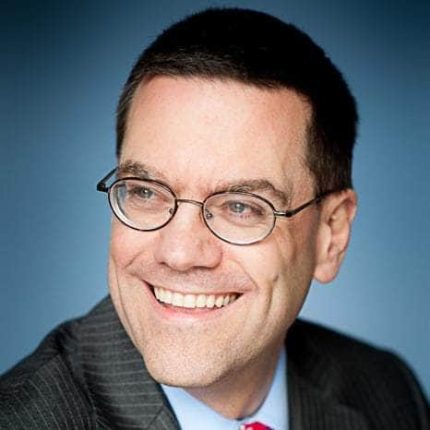It is 1848, and a spectre is haunting Europe. If you’re Karl Marx, that spectre is communism. But if you’re a member of the god-fearing gentry in west Wales, that spectre is the lack of education!
Here’s the South Wales and Monmouthshire Training College, later Trinity College, Carmarthen, later still part of University of Wales Trinity Saint David. It was opened in 1848, following the efforts of the National Society for Promoting the Education of the Poor in the Principles of the Established Church in England and Wales (they loved a snappy title in the nineteenth century). The National Society, as it was better known, had been established in 1811 to promote a religious education, mostly via Sunday schools. And there was a counterpart – the British and Foreign School Society for the Education of the Labouring and Manufacturing Classes of Society of Every Religious Persuasion – established in 1808 and 1814, which did the same but with less religion.
I’ve written before about how education policy in England and Wales developed slowly, and that compulsory, free education for children was a long time coming. The efforts of the National Society and the British and Foreign School Society had a big impact. And they included not only the operation of schools, but of training colleges for teachers.
Let’s take in the report from the magnificently named Monmouthshire Merlin of Saturday 4 November 1848 to get a flavour of the excitement in Carmarthen:
OPENING of the TRAINING COLLEGE CARMARTHEN.
This interesting event, which was anxiously looked forward to by the clergy and members of the Church Establishment in the Principality, took place on Tuesday week. The weather was very unpropitious; heavy showers descending the whole of the morning, which greatly marred the appearance of the imposing spectacle, and no doubt hindered many distant clergymen and gentlemen, as well as a great number of the respectable inhabitants of the town, from joining in the procession. At eleven o’clock the procession moved from the Town-Hall in the following order:
Police Constables of the Borough.
The Mayor and Corporation.
The Magistrates.
The Welsh Education Committee.
The Principal, Vice-Principal, and Master of the Training College.
The Clergy, in their gowns.
The Gentry and Inhabitants of the Neighbourhood. &c., &c.
After the procession reached St. Peter’s Church, divine service was performed, and the Right Rev. the Lord Bishop of St Da vid’s preached an excellent sermon, with his usual eloquence and ability, from the 12th chapter of the Romans, and the 6th, 7th, and 8th verses. The collection at the close of his lordship s eloquent appeal amounted to £ 67. 14s. 4d., a much larger sum than had ever been previously collected at St. Peters Church on any occasion. After the conclusion of the service, the procession was not re-formed; the parties departed, and proceeded towards the Training College, to partake of the cold collation which had been provided at that place. No ceremony was performed at the college, in connection with its opening, any farther than the throwing open of the doors to admit the visitors and others interested in the proceedings. The place is now ready for the reception of pupils, as the masters are in residence, and the arrangements are all complete. From the celebrity of the principal. and the salubrious situation of the college, we have no doubt that many will avail themselves of the opportunities now offered to them at this Training Institution. The building of the college is finished in the best style of workmanship, is replete with every convenience required by the pupils, and it reflects great credit on the architect and others concerned. The Model Schools are also in a state of great forwardness; and as the workmen have now been transferred from the Training College to them, it is expected they will be ready for opening in a very short time.
Romans chapter 12 verses 6, 7 and 8, by the way, read as follows:
6 Having then gifts differing according to the grace that is given to us, whether prophecy, let us prophesy according to the proportion of faith;
7 Or ministry, let us wait on our ministering: or he that teacheth, on teaching;
8 Or he that exhorteth, on exhortation: he that giveth, let him do it with simplicity; he that ruleth, with diligence; he that sheweth mercy, with cheerfulness.
The college did well. In 1967 there was an entrance examination for places, with tuition fees waived, and travelling expenses for successful students, as noted by the Carmarthen Journal of 26 July 1867. Note that the better students were given more money for travelling expenses; and that “all persons of good health and character” did not include women: the college first admitted women in 1957.

The college formally changed its name to Trinity College Carmarthen in 1931, although it seems likely that the name was used informally before then. I have seen, for example, a newspaper article of 1894 referring to its as Trinity College Carmarthen; and the postcard itself is certainly earlier than the 1930s.
Like most colleges, over time it grew, added new subjects and generally thrived. The college building expanded from that shown on the card, with other facilities and residences. In 1990 it became affiliated to the University of Wales, and became a full member college in 2004. By this time, of course, the University of Wales was in a degree of turmoil, with exits as well as entrances. Trinity gained degree awarding powers in 2008, became Trinity University College in 2009, and in 2010 merged with St David’s College – or University of Wales Lampeter – to form University of Wales Trinity Saint David.
Its most famous alumnus is arguably Barry John, one of the great fly halves of the legendary 1970s Welsh rugby team, and the punchline to Max Boyce’s Hymns and Arias.
The card was posted, but sadly the stamp has been removed, so the postmark is missing. It was sent to Mr Williams in the Cottage Hospital, Caernarfon. The original message in Cymraeg is below. As best as I can tell, the first part reads something like:
The weather for pilgrims far away is very good. We will be coming home next weekend.
(This probably isn’t entirely right.)
And then I can’t make out the words in the second half, so no chance of a translation, however bad. Can any reader do this?

Here’s a jigsaw for you too.













Fascinating!
btw, I think 1967 should read 1867:
“The college did well. In 1967 there was an entrance examination for places…”
Good spot, Fiona – thank you
last sentence is something like ‘hope you are keeping in good health, and thinking of you very fondly and warmly’
Diolch yn fawr!
middle sentence looks like something along the lines of I’ll be home next week
My mother’s time at Trinity College overlapped with Barry John – I gather that his academic/attendance record was such that anyone else would have been asked to leave! Unsurprisingly though he was doing PE as his specialist subject, and chucking him out would have been unthinkable as he was off playing rugby. I believe also that one of the lecturers at the time was on the WRFU coaching staff. (Incidentally, Max Boyce did once come and play for the SU.)